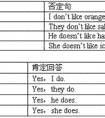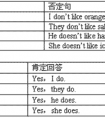用所给单词的正确形式填空。1. We (has)shortandstraighthair.2.Hereyes (be)blue, but(I)eyesareblack.3.Jenny'shairislong, butmyhairis(long).4.Mymotheris (you-五年级英语
题文
| 用所给单词的正确形式填空。 |
| 1. We (has) short and straight hair. 2. Her eyes (be) blue, but (I) eyes are black. 3. Jenny's hair is long, but my hair is (long). 4. My mother is (young) than my father. 5. Is she (tall) than you? 6. Who (have) three hairs? 7. (do) Bob wear glasses? |
答案
| 1. have 2. are, my 3. longer 4. younger 5. taller 6. has 7. Does |
据专家权威分析,试题“用所给单词的正确形式填空。1. We (has)shortandstraighthair...”主要考查你对 实义动词,物主代词,规则形容词的比较级,系动词,一般现在时,动词单数第三人称 等考点的理解。关于这些考点的“档案”如下:
实义动词物主代词规则形容词的比较级系动词一般现在时,动词单数第三人称
考点名称:实义动词
实义动词:
与系动词是相对的,系动词亦称连系动词,作为系动词,它本身有词义,但不能单独用作谓语,后边必须跟表语(亦称补语),构成系表结构说明主语的状况、性质、特征等情况。
实义动词意思完全,能独立用作谓语。
实义动词有及物动词和不及物动词(及物动词是指后面要求有直接宾语的动词;
不及物动词指后面不需要跟宾语的动词)即行为动词,表示动作的动词。
实义动词(又称行为动词):表示行为或状态,有完全的词义,能独立作谓语。
如:I go to school by bus. 我乘公交车去上学。
The students clean their classroom every day. 学生每天打扫教室。- 及物动词:
后面必须跟宾语,意义才完整的实义动词,叫做及物动词(transitive verb)。
英语中的及物动词有:interest,worry,guss,please,surprise,love等
例如:I believe that the committee will consider our suggestion.我相信委员会将会考虑我们的建议。
“How long can I keep the book ”Harry asked.哈里问:“这本书我可以借多久?”
Dr. Bethune set us a good example. 白求恩大夫给我们树立了好榜样。
Crude oil contains many useful substances.原油含有许多有用的物质。
不及物动词:
本身意义完整,后面不用跟宾语的实义动词,叫做不及物动词(intransitive verb)。
Birds fly.鸟会飞。
It happened in June 1932.这件事发生于一九三二年六月。
My watch stopped.我的表停了。
She spoke at the meeting yesterday evening. 她在昨天晚上的会上发了言。
兼作及物动词和不及物动词:
英语里有不少实义动词可以兼作及物动词和不及物动词。
这样的动词又有两种不同的情况:
a)兼作及物动词和不及物动词时,意义不变。试比较:
Shall I begin at once?我可以立刻开始吗?(begin作不及物动词)
She began working as a librarian after she left school.她毕业后当图书馆管理员。(began作及物动词)
When did they leave Chicago?他们是什么时候离开芝加哥的?(leave 作及物动词)
They left last week. 他们是上周离开的。(left 作不及物动词)
b)兼作及物动词和不及物动词时,有时意义不尽相同。如:
Wash your hands before meals.饭前要洗手。
Does this cloth wash well? 这布经得起洗吗?
与汉语的比较:
有时英语动词的及物和不及物的用法,与汉语的用法完全不一样,请注意下列两种情况:
a)有的动词在英语里只能用作不及物动词,而汉语则可用作及物动词,如arrive到达,agree同意,listen听。英语里这些动词后面常接介词。如:
We arrived at the railway station at noon.我们于中午到达火车站。(at不能省去)(比较:We reached the railway station at noon.)
Everybody listened to the lecture with great interest.每个人都很有兴趣地听讲课。(to不可省去)(比较:We all heard the lecture.)
Do they agree to the plan?他们同意这个计划吗?(to不可以省去)
b)有的动词在英语里能用作及物动词,而在汉语里则不能用作及物动词,如serve为…服务。
Our children are taught to serve the people wholeheartedly.我们的儿童被教以全心全意为人民服务 - 特殊实义动词:
英语动词很多既是及物动词又是不及物动词,如
close, begin, study, leave, work等。
①The post office closes at 9:00 p. m.邮局晚上9点关门。
②Close the window,please.请关窗。
③Shall we begin now?我们现在开始吗?
④ Bill began working as a sailor after he left school.比尔毕业后当水手。
⑤They left yesterday.他们昨天离开的。
⑥When did you leave Washington?你什么时候离开华盛顿的?
⑦The students study hard.这些学生学习努力。
⑧The students study English and German.这些学生学习英语和德语。
⑨He works in a supermarket.他在一家超市工作。
⑩He works the machine on Mondays.他星期一操作这台机器。
考点名称:物主代词
- 物主代词:
表示所有关系的代词叫做物主代词,也叫人称代词的所有格。物主代词分为名词性物主代词和形容词性物主代词两种。其中,形容词性物主代词后面需加名词;
名词性物主代词可直接作名词用,后面无需再加名词。




![We ____________together. [ ]A. read a bookB. sleep-一年级英语](http://www.00-edu.com/d/file/ks/4/1/60/2019-08-28/smallea4b9832081df346c35e7fe937dd76101566947664.gif)
![What's he doing? He's ___________. [ ]A. readingB. drawing-四年级英语](http://www.00-edu.com/d/file/ks/4/1/60/2019-08-28/small07eb195a0f249b46b2d76d31ab9e28261566947675.jpg)
